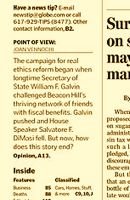The Boston Globe has been notably favorable toward charter schools both on its opinion pages and in its news coverage. But if you oppose Question 2, a referendum that would expand the number of charter schools in Massachusetts (as I do), then you’ve got to like two pieces in today’s Globe.
First, a story by David Scharfenberg on a study by the Massachusetts Taxpayers Foundation that claims to show charter schools aren’t draining money from regular public schools notes in the second paragraph that the study was paid for by a pro-charter-school organization:
The Massachusetts Taxpayers Foundation study, paid for by the pro-charter Boston Foundation, shows that per-pupil spending in traditional public schools has grown at about the same rate as per-pupil spending in charter schools over the past five years.
Interestingly, the original version of Scharfenberg’s story, posted online Wednesday, made no mention of the funding. Whatever the reason, I’m glad that he and/or his editors decided to add that important context later on. And by the way: the study actually shows that, in some communities, the financial bite caused by charter schools is pretty serious.
Second, Joan Vennochi observes in her opinion column that Sen. Elizabeth Warren’s opposition to the ballot question is likely to be a big deal. Toward the end, Vennochi writes:
I don’t like union resistance to needed reform. But I also dislike charter advocates’ portrayal of union-backed teachers as universally lazy and inept. Of course, parents naturally want the best education for their children and they should be able to choose what that means. But the creation of a two-tiered system betrays the very mission of public education [emphasis added].
That really goes to the heart of the matter. Because the political will doesn’t exist to create great public schools for everyone, charter-school proponents want to create them for a few. It’s just unacceptable.
Disclosure: My wife is a public school teacher and a union member in a community unlikely to be affected if Question 2 is approved.



 Craig Silverman of Poynter Online weighs in with
Craig Silverman of Poynter Online weighs in with 

